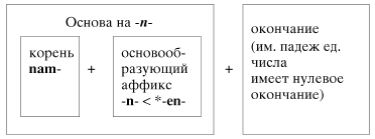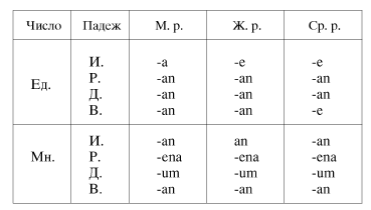Among different consonant declensions the only living consonant declension in OE was n -stem declension, this type being characteristic not only of Germanic languages but also of other languages of the Indo-European family, such as Russian or Latin (Vanduo-vandens-vandeniui-vandeni-vandens, homo – homini). In Russian words belonging to n -declension are of neuter gender (пламя, семя, вымя, темя, племя, стремя, бремя,). In O.E. here belonged nouns of feminine and masculine genders, rarely neuter.
OE eaʒe – neuter gender (eye)
OE eare – neuter gender (ear) The nouns belonging to feminine and neuter genders had in the Nominative case singular the inflection –e: hearpe (fem.) – harp, eare (ntr.) – ear; while the nouns of masculine gender in the Nominative case singular had the inflection – a: OE hunta (hunt). In all the oblique cases the nouns belonging to this declension had one and the same ending – an:
Masculine Feminine Neuter – singular Plural
Nom. hunta hearpe eare huntan, hearpan,earan
Acc. huntan hearpan earan huntan, hearpan,earan
Dative hunt hearpan earan huntum, hearpum,earum
Gen. huntan hearpan earan huntena, hearpena, earena
In Russian the words belonging to this declension are of neuter gender.



All oblique cases (косвенные падежи) had one and the same ending – an
 2014-02-09
2014-02-09 921
921








